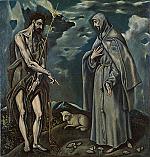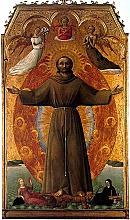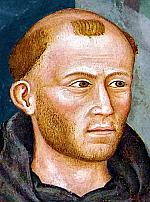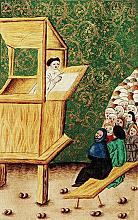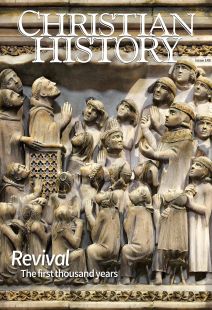Christian History Timeline: Reform, renewal, revival, reaction
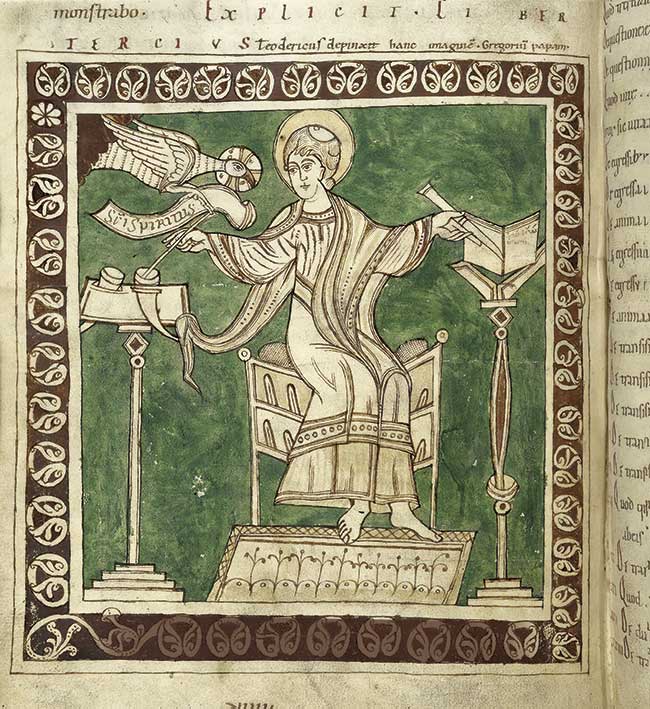
[Miniature of Gregory the Great in Dialogi, early 12th century. MS Harley 3011 f. 69v.—British Library / [CC0] Wikimedia File:Gregory the Great with the Holy Spirit.jpg]
—910 William of Aquitaine founds a strict Benedictine monastery at Cluny.
—c.950 A monk named Adso writes a popular apocalyptic treatise.
—1073 Gregory VII (Hildebrand) is elected pope.
—1084 Bruno of Cologne begins the Carthusian order.
—1075 Gregory VII prohibits lay investiture and writes Dictatus papae.
—1095 The Chanson de Roland depicts Charlemagne as a messianic figure.
—1098 Robert of Molesme founds a monastery at Cîteaux to reform the Cluniac order.
—1112 Bernard enters the Cîteaux monastery.
—1115 Bernard founds a Cistercian abbey at Clairvaux.
—1146 Bernard preaches a famous sermon at Vézelay urging support of the Second Crusade.
—c. 1146 Hildegard of Bingen goes on the first of her preaching tours.
—c. 1173 Valdes of Lyons abandons his business, distributes his goods, and preaches the gospel in public. He and his followers, the Waldensians, are later exiled.
—1179 The Third Lateran Council condemns simony.
—1200 Joachim of Fiore submits his apocalyptic writings to the judgment of the pope.
—1205 At San Damiano, Francis of Assisi hears the words “Rebuild my church.”
—1209 Francis organizes the Order of Friars Minor (Franciscans).
—1212 Francis and Clare of Assisi organize the Poor Clares.
—1216 Dominic founds the Dominicans.
—1217 Valdes of Lyons dies. The Waldensians spread, despite persecution.
—c. 1220–1221 Francis resigns as leader of the Friars Minor.
—1233 Pope Gregory IX issues Gloriam Virginalem protecting the rapidly spreading Beguine movement.
—c. 1260 Meister Eckhart, later known as a mystic and a Dominican preacher, is born.
—c. 1300 Johannes Tauler, disciple of Eckhart, is born.
—1309–1377 The papacy moves to France in the “Babylonian Captivity.”
—1321 Dante completes the Divine Comedy.
—c. 1329–1330 Henry Suso writes the Clock of Wisdom.
—c. 1339–1343 A group known as the Friends of God gathers around Tauler and Suso.
—1340s Richard Rolle writes The Fire of Love.
—1347–1350 Bubonic plague sweeps through Europe.
—1350 Jan van Ruusbroec writes Spiritual Espousals.
—1367 Rulman Merswin buys an abandoned convent as a retreat center for the Friends of God.
—1373 Julian of Norwich begins writing.
—1374 Ludolph of Saxony writes Life of Christ. Gerard Groote turns his house into a gathering place, beginning the Devotio Moderna movement.
—1377 John Wycliffe is censured for the first time. His followers will develop into the Lollard movement. Around this time William Langland writes Piers Plowman.
—1378 Wycliffe writes On the Truth of Sacred Scripture.
—1381 John Ball leads the Peasants’ Revolt.
—c. 1384 Florens Radewyns leads the formation of the Brothers of the Common Life. Thomas à Kempis, Martin Luther, and Erasmus will later be educated by the Brothers.
—1382–1386 John Mirk composes the Festial sermon collection.
—1386 The Windesheim Congregation of Canons Regular grows out of the Devotio Moderna.
—1387–1400 Geoffrey Chaucer writes the Canterbury Tales.
—c. 1395 Julian’s Revelations of Divine Love is published.
—1404 Franciscan Bernardino of Siena becomes a priest.
—1404–1418 The Council of Constance declares Hus and Wycliffe heretics— Wycliffe posthumously. In 1415 Hus is burned at the stake.
—1400s Anonymous author pens Theologia Germanica.
—1418 Thomas à Kempis’s The Imitation of Christ is first published.
—c. 1430 Margery Kempe dictates The Book of Margery Kempe to scribes.
—1431 Joan of Arc is burned at the stake.
—1455 Gutenberg prints his first Bible.
—1470 Girolamo Savonarola attempts to reform Florence.
—1498 Savonarola is hanged and then burned at the stake.
—1517 Luther publishes his 95 Theses.
—1524–1525 Peasants’ Revolt breaks out in Germany.
—1527 Swiss Anabaptists write The Schleitheim Confession.
—1536 John Calvin first publishes his Institutes.
By the editors
[Christian History originally published this article in Christian History Issue #149 in 2023]
Next articles
“Repair my house”
Francis of Assisi and his followers called the church back to holiness through vibrant preaching and voluntary poverty
Jon M. SweeneyWalking in the way of St. Francis
Recommendations for reform from the traveling preacher
Francis of AssisiWinds of spiritual renewal
Mystics looked inward to revive and renew the love of christ
Glenn E. MyersFirst, preach Christ’s gospel
Many medieval preachers intended their sermons to renew and revive
Beth Allison Barr



